语法--英语词性分类及用法
2023年初中英语语法考试:词性分类12种及词性转换七大规则
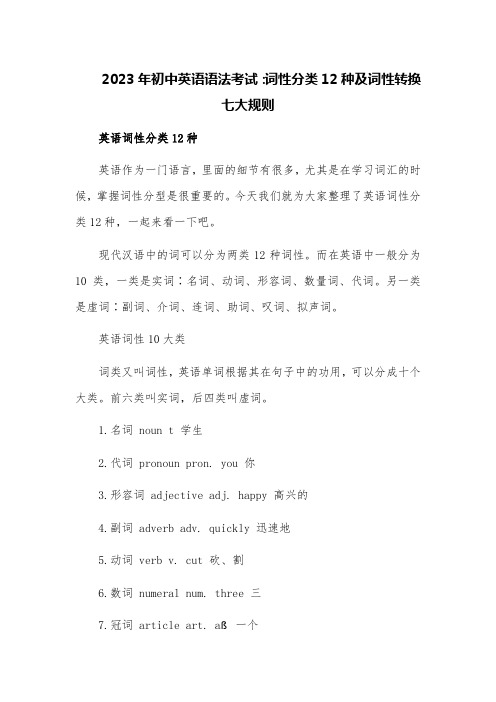
2023年初中英语语法考试:词性分类12种及词性转换七大规则英语词性分类12种英语作为一门语言,里面的细节有很多,尤其是在学习词汇的时候,掌握词性分型是很重要的。
今天我们就为大家整理了英语词性分类12种,一起来看一下吧。
现代汉语中的词可以分为两类12种词性。
而在英语中一般分为10类,一类是实词∶名词、动词、形容词、数量词、代词。
另一类是虚词∶副词、介词、连词、助词、叹词、拟声词。
英语词性10大类词类又叫词性,英语单词根据其在句子中的功用,可以分成十个大类。
前六类叫实词,后四类叫虚词。
1.名词 noun t 学生2.代词 pronoun pron. you 你3.形容词 adjective adj. happy 高兴的4.副词 adverb adv. quickly 迅速地5.动词 verb v. cut 砍、割6.数词 numeral num. three 三7.冠词 article art. aß一个8.介词 preposition prep. at 在...9.连词 conjunction conj. and 和10.感叹词 interjection interj. oh 哦2 具体英语词性介绍及用法名词在英语中有些名词可以加"'s"来表示所有关系,带这种词尾的名词形式称为该名词的所有格,如∶ a teacher's book。
名词所有格的规则如下∶1)单数名词词尾加"'s",复数名词词尾没有s,也要加"'s",如the boy's bag男孩的书包,men's room 男厕所。
2)若名词已有复数词尾-s ,只加"'",如∶ the workers' st∶ers' struggle工人的斗争。
3)凡不能加"'s"的名词,都可以用"名词+of +名词"的结构来表示所有关系,如∶ the title oföthe song 歌的名字。
英语词性分类和用法
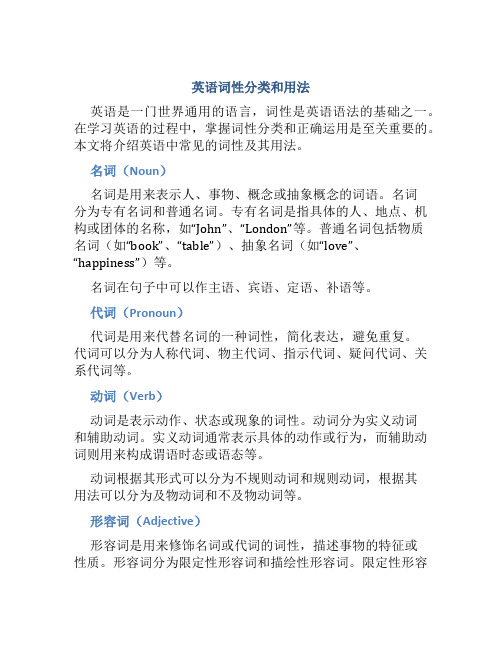
英语词性分类和用法英语是一门世界通用的语言,词性是英语语法的基础之一。
在学习英语的过程中,掌握词性分类和正确运用是至关重要的。
本文将介绍英语中常见的词性及其用法。
名词(Noun)名词是用来表示人、事物、概念或抽象概念的词语。
名词分为专有名词和普通名词。
专有名词是指具体的人、地点、机构或团体的名称,如“John”、“London”等。
普通名词包括物质名词(如“book”、“table”)、抽象名词(如“love”、“happiness”)等。
名词在句子中可以作主语、宾语、定语、补语等。
代词(Pronoun)代词是用来代替名词的一种词性,简化表达,避免重复。
代词可以分为人称代词、物主代词、指示代词、疑问代词、关系代词等。
动词(Verb)动词是表示动作、状态或现象的词性。
动词分为实义动词和辅助动词。
实义动词通常表示具体的动作或行为,而辅助动词则用来构成谓语时态或语态等。
动词根据其形式可以分为不规则动词和规则动词,根据其用法可以分为及物动词和不及物动词等。
形容词(Adjective)形容词是用来修饰名词或代词的词性,描述事物的特征或性质。
形容词分为限定性形容词和描绘性形容词。
限定性形容词用来指明被修饰词的范围,如“this”,“the”,等。
描绘性形容词则用来描述被修饰词的特征,如“beautiful”,“clever”等。
副词(Adverb)副词是用来修饰动词、形容词或其他副词的词性,表示程度、时间、原因或方式。
副词可以分为时间副词、地点副词、方式副词、程度副词等。
介词(Preposition)介词是连接名词、代词或动词与其他词语的词性,表示时间、空间或逻辑关系。
常用的介词包括“in”,“on”,“at”,“under”,等。
连词(Conjunction)连词是用来连接词语、短语、从句或句子的词性,构成完整的句子结构。
连词分为并列连词、从属连词和相关副词。
冠词(Article)冠词是用来修饰名词的词性,包括定冠词“the”和不定冠词“a/an”。
英语语法的词性及简单用法分类

英语语法
一.九大类词
1.牛逼词性:名词、数词、代词;动词
2.修饰词性:形容词【名】;副词、介词(介宾短语)【动、形、名】
3.依附词性:冠词【名词前】;连词【连句子】
并列连词[and,or,but,so]
名词性从句[that,whether,各种what-]
定语从句[who,which,that,when,where,why]
状语从句[when,if,because,although,as]
二.五大基本句型
1.主谓
2.主系表
3.主谓宾
4.主谓双宾
5.主谓宾宾补
三.六大句子成分
4.定语:功能是,修饰限定某个名词,说明名词的特征属性。
一般
情况下,主要是形容词。
定语从句-形容词性从句
5.状语:功能是,表明[动词、形容词、副词]的程度状况,或[整个
句子]的时间、地点、原因等状况。
状语从句-副词性从句6.补语/表语:宾补[补充说明]宾补,表语[补充说明]主语。
初中英语的十大词性分类及其用法

初中英语的十大词性分类及其用法英语语法最基础的就是词性了!因为后续的各种时态变化、从句很多的考点都是结合词性才产生的!要想学好语法,那就一定要打牢词性这个基础!一、词性的分类词类又叫词性,英语单词根据其在句子中的功用,可以分成十个大类。
1.名词noun n. student 学生2.代词pronoun pron. you 你3.形容词adjective adj. happy 高兴的4.副词adverb adv. quickly 迅速地5.动词verb v. cut 砍、割6.数词numeral num. three 三7.冠词article art. a 一个8.介词preposition prep. at 在...9.连词conjunction conj. and 和10.感叹词interjection interj. oh 哦前六类叫实词,后四类叫虚词。
二、名词名词复数的规则变化名词的所有格在英语中有些名词可以加“‘s”来表示所有关系,带这种词尾的名词形式称为该名词的所有格,如:a teacher’s book。
名词所有格的规则如下:1)单数名词词尾加“'s”,复数名词词尾没有s,也要加“'s”,如the boy‘s bag 男孩的书包,men’s room 男厕所。
2)若名词已有复数词尾-s ,只加“'”,如:the workers’ struggle工人的斗争。
三、代词大多数代词具有名词和形容词的功能。
英语中的代词,按其意义、特征及在句中的作用分为:人称代词、物主代词、指示代词、反身代词、相互代词、疑问代词、关系代词、连接代词和不定代词九种人称代词的用法:I saw her with them,at least,I thought it was her.我看到她和他们在一起,至少我认为是她。
(her做宾语,them做介词宾语,her作主补)a. -- Who broke the vase?--谁打碎了花瓶?b. -- Me.--我。
语法--英语词性分类及用法

walk.(2000杭州)
3. There are three
A.people
B.minutes C.minutes' A in my family. (2004长春) B. person
C. child 4. Most students can go to college for further A A. education 5. This is B. information C.science
C 1.Several _____ are talking under the tree.And they are______. A.woman;children B.woman;child C.women;children 2.—How far is your school from here? —Not very far.It's about twenty C A.minute's
其它名词复数的规则变化
4.以o 结尾的名词,变复数时:
a. 加s,如: photo---photos piano---pianos radio---radios zoo---zoos; b. 加es,如:potato—potatoes tomato—tomatoes
语法--英语词性分类及用法

行为动词的分类
及物动词与不及物动词 根据后面是否带宾语,行为动词又可分为及物动词和不及物动词,及物
动词(vt. ) 后面要跟宾语,不及物动词(vi. ) 不跟宾语。如: They study hard. (study后没有宾语,是不及物动词) I know them well. (know后有宾语them,是及物动词) 注:有的动词既可作及物动词,也可用作不及物动词. 如:She sings very well. (sing是不及物动词) She sang an English song just now. (sing是及物动词)
2) 叙述形容词只能作表语,所以又称为表语形容词。这 类形容词没有级的变化,也不可用程度副词修饰。大多数 以a开头的形容词都属于这一类。例如:afraid, alone 等.
副词 (主要用来修饰动词,形容词,副词或整个句子)
说明时间、地点、程度、方式等概念。
时间副词: soon, then, today, tomorrow, afterwards , now, 地点副词:
代词是非常活跃的词,特别是不定代词,比较复杂,我们要熟 练掌握。
形容词
(修饰名词等,说明事物或人的性质或特征的词)
形容词可分成性质形容词和叙述形容词两类,其位置不一 定都放在名词前面。
1) 直接说明事物的性质或特征的形容词是性质形容词, 它有级的变化,可以用程度副词修饰,在句中可作定语、 表语和补语。例如:hot ,good ,wonderful等.
名词可以分为专有名词和普通名词 .
专有名词是某个(些)人,地方,机构等专有的名称,如Beijing, China, the United States,等。
普通名词是一类人或东西或是一个抽象概念的名词,如:book, sadness等。(普通名词包括可数名词和不可数名词)
英语基本词性及语法
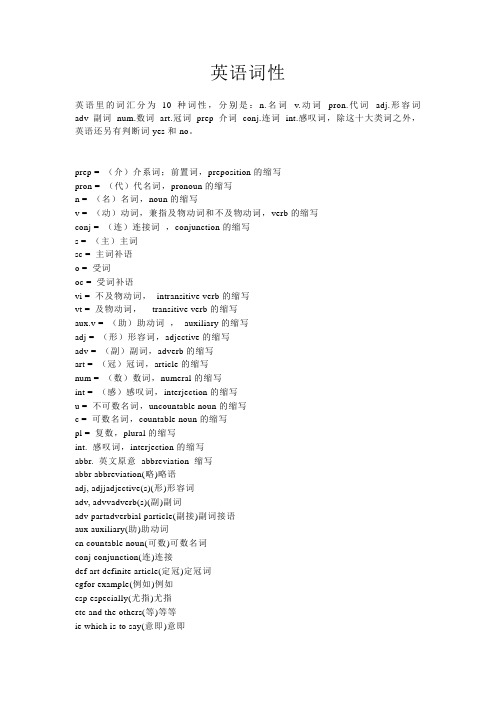
英语词性英语里的词汇分为10种词性,分别是:n.名词v.动词pron.代词adj.形容词adv副词num.数词art.冠词prep 介词conj.连词int.感叹词,除这十大类词之外,英语还另有判断词yes和no。
prep = (介)介系词;前置词,preposition的缩写pron = (代)代名词,pronoun的缩写n = (名)名词,noun的缩写v = (动)动词,兼指及物动词和不及物动词,verb的缩写conj = (连)连接词,conjunction的缩写s = (主)主词sc = 主词补语o = 受词oc = 受词补语vi = 不及物动词, intransitive verb的缩写vt = 及物动词, transitive verb的缩写aux.v = (助)助动词, auxiliary的缩写adj = (形)形容词,adjective的缩写adv = (副)副词,adverb的缩写art = (冠)冠词,article的缩写num = (数)数词,numeral的缩写int = (感)感叹词,interjection的缩写u = 不可数名词,uncountable noun的缩写c = 可数名词,countable noun的缩写pl = 复数,plural的缩写int. 感叹词,interjection的缩写abbr. 英文原意abbreviation 缩写abbr abbreviation(略)略语adj, adjjadjective(s)(形)形容词adv, advvadverb(s)(副)副词adv partadverbial particle(副接)副词接语aux auxiliary(助)助动词cn countable noun(可数)可数名词conj conjunction(连)连接def art definite article(定冠)定冠词egfor example(例如)例如esp especially(尤指)尤指etc and the others(等)等等ie which is to say(意即)意即indef art indefinite article(不定冠词)不定冠词inf infinitive(不定词)不定词int interjection(感)感叹词n noun(s) (名)名词neg negative(ly)(否定)否定的(地)part adj participial adjective(分形)分词形容词pers person(人称)人称pers pron personal pronoun(人称代)人称代名词pl plural(复)复数(的)pp past participle (过去分词)过去分词pref prefix(字首)字首prep preposition(al) (介词)介词,介系词,介词的pron pronoun (代)代名词pt past tense(过去)过去式sb somebody(某人)某人sing singular(单)单数(的)sth something(某事物)某物或某事suff suffix(字尾)字尾un uncountable noun(不可数)不可数名词US America(n)(美)美国(的)vverb(s) (动)动词[VP]Verb Pattern(动型)动词类型vi verb intransitive(不及物动词)不及物动词vt verb transitive (及物动词)及物动词分类实词:表示实在意义的词,有名词、动词、形容词、数词、量词、代词、副词。
英语词性分类及用法技巧口诀

英语词性分类及用法技巧口诀在英语学习中,词性是非常重要的概念。
了解不同词性的特点以及它们在句子中的用法对于语法的正确运用至关重要。
本文将介绍英语中常见的词性以及一些记忆口诀,帮助读者更好地掌握英语词性分类及用法技巧。
英语词性分类英语中的词性主要分为名词、动词、形容词、副词、代词、介词、连词和感叹词等几类。
每种词性都有其独特的特点和用法,下面分别简单介绍每种词性的特点:•名词:表示人、事物、地点、概念等,通常作主语、宾语或表语。
•动词:表示动作、状态或行为,通常用来构成句子的谓语。
•形容词:用来修饰名词或代词,表示人或事物的特征或性质。
•副词:用来修饰动词、形容词或其他副词,表示时间、地点、方式、原因等。
•代词:用来代替名词,分为人称代词、指示代词、疑问代词、不定代词等。
•介词:用来引导名词、代词或动词等的关系,表示方位、时间、原因等。
•连词:用来连接句子成分或句子之间的关系。
•感叹词:表示感情、情感、呼唤等,通常单独使用,并具有感叹的语气。
词性用法技巧口诀为了更好地记忆和区分不同词性的用法,下面给出一些词性用法技巧口诀:1.名词:人称、性质、动物、玩具;地方、物品、时间、概念;做主语、宾语或表语,了解其特殊用途。
2.动词:表示动作、状态句子有;行为、运动、存在态;是谓语、时态需掌握,语法错误要避免。
3.形容词:修饰名词或代词,性质、颜色等描述;比较级、最高级要用对,用途广泛易掌握。
4.副词:多是ly结尾,修饰动词或形容词;表示时间、地点、程度,顺序、原因等承接。
5.代词:人称、指示、不定有,人物东西常可用;作主语、宾语、宾格,位置使用应谨慎。
6.介词:方位、时间、目的求,关系词尾易掌握;连接名词词组动词短,转义句子必要意。
7.连词:连接句子或成分,承接递进并列分;从属或并列两重用,理解句意用法准。
8.感叹词:表示情感和呼唤,通常放句末单独用;惊叹、调侃、祝贺表,语气感情表达务须。
通过口诀的记忆,希望读者能够更清晰地了解英语词性分类及用法技巧,提高语法运用的准确性和流利度。
小学英语常考十类词性的详解+用法+考点

小学英语常考十类词性的详解+用法+考点英语语法最最基础的就是词性了!!因为后续的各种时态变化、从句很多的考点都是结合词性才产生的!要想学好语法,那就一定要打牢词性这个基础!我们总结整理了英语常考十类词性的详解+用法+考点,这个很有必要收藏起来!词类又叫词性,英语单词根据其在句子中的功用,可以分成十个大类。
1.名词noun n. student 学生2.代词pronoun pron. you 你3.形容词adjective adj. happy 高兴的4.副词adverb adv. quickly 迅速地5.动词verb v. cut 砍、割6.数词numeral num. three 三7.冠词article art. a 一个8.介词preposition prep. at 在...9.连词conjunction conj. and 和10.感叹词interjection interj. oh 哦前六类叫实词,后四类叫虚词。
名词复数的规则变化名词的格在英语中有些名词可以加“‘s”来表示所有关系,带这种词尾的名词形式称为该名词的所有格,如:a teacher’s book。
名词所有格的规则如下:1)单数名词词尾加“\\\\'s”,复数名词词尾没有s,也要加“\\\\'s”,如the boy ‘s bag 男孩的书包,men’s room 男厕所。
2)若名词已有复数词尾-s ,只加“\\\\'”,如:the workers’struggle工人的斗争。
代词大多数代词具有名词和形容词的功能。
英语中的代词,按其意义、特征及在句中的作用分为:人称代词、物主代词、指示代词、反身代词、相互代词、疑问代词、关系代词、连接代词和不定代词九种人称代词的用法:I saw her with them,at least,I thought it was her.我看到她和他们在一起,至少我认为是她。
英语语法知识点-词性
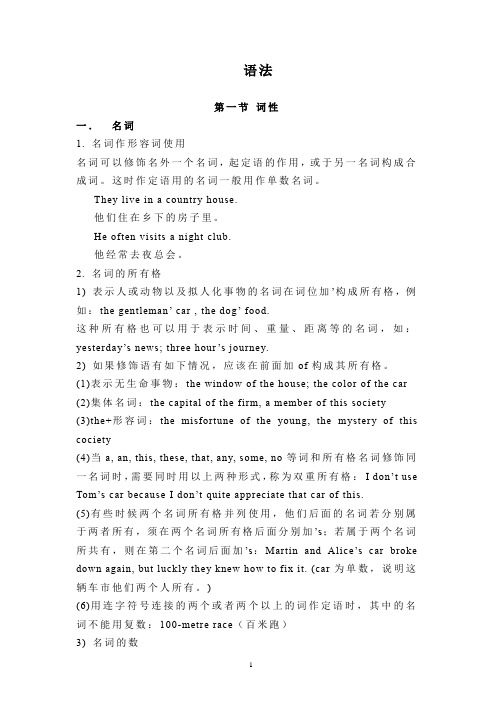
语法第一节词性一.名词1. 名词作形容词使用名词可以修饰名外一个名词,起定语的作用,或于另一名词构成合成词。
这时作定语用的名词一般用作单数名词。
They live in a country house.他们住在乡下的房子里。
He often visits a night club.他经常去夜总会。
2. 名词的所有格1) 表示人或动物以及拟人化事物的名词在词位加’构成所有格,例如:the gentleman’ car , the dog’ food.这种所有格也可以用于表示时间、重量、距离等的名词,如:yesterday’s news; three hour’s journey.2) 如果修饰语有如下情况,应该在前面加of构成其所有格。
(1)表示无生命事物:the window of the house; the color of the car(2)集体名词:the capital of the firm, a member of this society(3)the+形容词:the misfortune of the young, the mystery of this cociety(4)当a, an, this, these, that, any, some, no等词和所有格名词修饰同一名词时,需要同时用以上两种形式,称为双重所有格:I don’t use Tom’s car because I don’t quite appreciate that car of this.(5)有些时候两个名词所有格并列使用,他们后面的名词若分别属于两者所有,须在两个名词所有格后面分别加’s;若属于两个名词所共有,则在第二个名词后面加’s:Martin and Alice’s car broke down again, but luckly they knew how to fix it. (car为单数,说明这辆车市他们两个人所有。
高中英语必须牢记的英语十类词性分类及用法
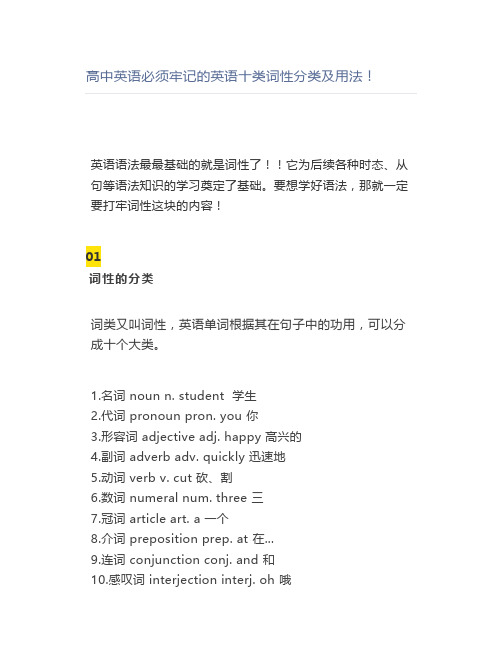
高中英语必须牢记的英语十类词性分类及用法!英语语法最最基础的就是词性了!!它为后续各种时态、从句等语法知识的学习奠定了基础。
要想学好语法,那就一定要打牢词性这块的内容!01词性的分类词类又叫词性,英语单词根据其在句子中的功用,可以分成十个大类。
1.名词 noun n. student 学生2.代词 pronoun pron. you 你3.形容词 adjective adj. happy 高兴的4.副词 adverb adv. quickly 迅速地5.动词 verb v. cut 砍、割6.数词 numeral num. three 三7.冠词 article art. a 一个8.介词 preposition prep. at 在...9.连词 conjunction conj. and 和10.感叹词 interjection interj. oh 哦前六类叫实词,后四类叫虚词。
下面就一一介绍02名词名词复数的规则变化名词的格在英语中有些名词可以加“‘s”来表示所有关系,带这种词尾的名词形式称为该名词的所有格,如:a te acher’s book。
名词所有格的规则如下:1)单数名词词尾加“'s”,复数名词词尾没有s,也要加“'s”,如the boy‘s bag 男孩的书包,men’s room 男厕所。
2)若名词已有复数词尾-s ,只加“'”,如:the workers’ struggle工人的斗争。
03代词大多数代词具有名词和形容词的功能。
英语中的代词,按其意义、特征及在句中的作用分为:人称代词、物主代词、指示代词、反身代词、相互代词、疑问代词、关系代词、连接代词和不定代词九种。
人称代词的用法I saw her with them,at least, I thought it was her.我看到她和他们在一起,至少我认为是她。
(her做宾语,them做介词宾语,her作主补)a. -- Who broke the vase?--谁打碎了花瓶?b. -- Me.--我。
高考英语词性分类与用法梳理,帮你搞定语法填空

在英语学习中,很多同学分不清楚什么是代词、名词,还是形容词,也不太清楚这些词该如何用,导致考试的时候,随便选一个,对错只能靠运气了,这样势必会影响成绩。
其实,英语中的这些词性,看似很容易弄混,但也有规律可循,距离高考还有二十几天的时间,小天对英语词性分类与用法进行了梳理,帮助同学们掌握词性的同时,提升英语语法填空成绩与能力。
1. 名词名词是指代人、物、事、时、地、情感、概念等实体或抽象事物的词。
名词可以分为专有名词(Proper Nouns)和普通名词 (Common Nouns),专有名词是某个(些)人、地方、机构等专有的名称,如Beijing,China等;普通名词是一类人或东西或是一个抽象概念的名词,如:book,sadness等。
小天提示:名词有时可以单独作为一个句子。
名词,还有可数名词、不可数名词的区别,同学们在学习中要注意。
(两者之间的用法可以参考之前的推文)2. 代词英语中的代词按其意义、特征及在句中的作用通常分为:人称代词、物主代词、指示代词、反身代词、疑问代词、关系代词和不定代词等。
1)人称代词有主格和宾格之分:主格有I, you, he, she, it, we, they等,宾格有me, you, him, her, it, us, you, them等。
2)物主代词有形容词性和名词性两种:形容词性物主代词my, your, his,her等,名词性物主代词mine, yours, his, hers等。
3) 反身代词:myself, yourself, himself, herself, ourselves,等。
4)指示代词:this, that, these, those等。
5)疑问代词:what, which, who, whom, whose等。
6)不定代词:some,any, something, somebody等。
7)关系代词: that, who, whom, whose, which, as 等。
英语语法--词性
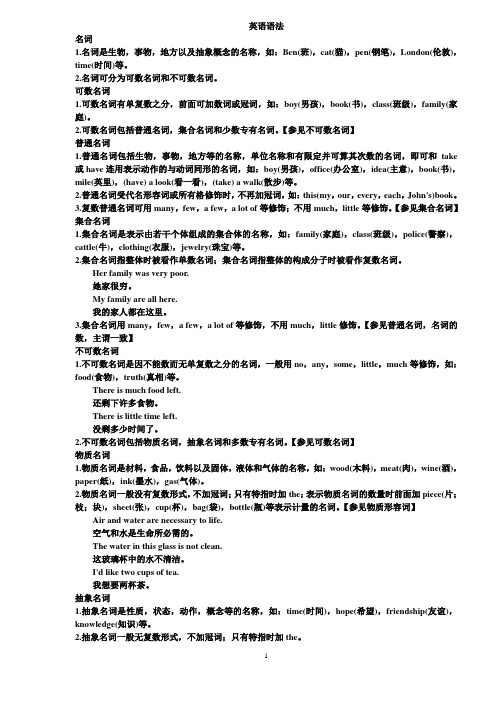
英语语法名词1.名词是生物,事物,地方以及抽象概念的名称,如:Ben(班),cat(猫),pen(钢笔),London(伦敦),time(时间)等。
2.名词可分为可数名词和不可数名词。
可数名词1.可数名词有单复数之分,前面可加数词或冠词,如:boy(男孩),book(书),class(班级),family(家庭)。
2.可数名词包括普通名词,集合名词和少数专有名词。
【参见不可数名词】普通名词1.普通名词包括生物,事物,地方等的名称,单位名称和有限定并可算其次数的名词,即可和take 或have连用表示动作的与动词同形的名词,如:boy(男孩),office(办公室),idea(主意),book(书),mile(英里),(have) a look(看一看),(take) a walk(散步)等。
2.普通名词受代名形容词或所有格修饰时,不再加冠词,如:this(my,our,every,each,John's)book。
3.复数普通名词可用many,few,a few,a lot of等修饰;不用much,little等修饰。
【参见集合名词】集合名词1.集合名词是表示由若干个体组成的集合体的名称,如:family(家庭),class(班级),police(警察),cattle(牛),clothing(衣服),jewelry(珠宝)等。
2.集合名词指整体时被看作单数名词;集合名词指整体的构成分子时被看作复数名词。
Her family was very poor.她家很穷。
My family are all here.我的家人都在这里。
3.集合名词用many,few,a few,a lot of等修饰,不用much,little修饰。
【参见普通名词,名词的数,主谓一致】不可数名词1.不可数名词是因不能数而无单复数之分的名词,一般用no,any,some,little,much等修饰,如:food(食物),truth(真相)等。
英语十大词性及用法
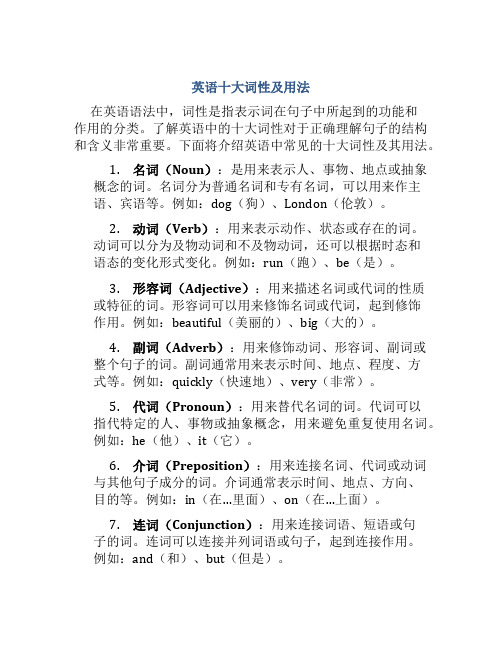
英语十大词性及用法在英语语法中,词性是指表示词在句子中所起到的功能和作用的分类。
了解英语中的十大词性对于正确理解句子的结构和含义非常重要。
下面将介绍英语中常见的十大词性及其用法。
1.名词(Noun):是用来表示人、事物、地点或抽象概念的词。
名词分为普通名词和专有名词,可以用来作主语、宾语等。
例如:dog(狗)、London(伦敦)。
2.动词(Verb):用来表示动作、状态或存在的词。
动词可以分为及物动词和不及物动词,还可以根据时态和语态的变化形式变化。
例如:run(跑)、be(是)。
3.形容词(Adjective):用来描述名词或代词的性质或特征的词。
形容词可以用来修饰名词或代词,起到修饰作用。
例如:beautiful(美丽的)、big(大的)。
4.副词(Adverb):用来修饰动词、形容词、副词或整个句子的词。
副词通常用来表示时间、地点、程度、方式等。
例如:quickly(快速地)、very(非常)。
5.代词(Pronoun):用来替代名词的词。
代词可以指代特定的人、事物或抽象概念,用来避免重复使用名词。
例如:he(他)、it(它)。
6.介词(Preposition):用来连接名词、代词或动词与其他句子成分的词。
介词通常表示时间、地点、方向、目的等。
例如:in(在…里面)、on(在…上面)。
7.连词(Conjunction):用来连接词语、短语或句子的词。
连词可以连接并列词语或句子,起到连接作用。
例如:and(和)、but(但是)。
8.冠词(Article):用来限定名词的词。
有定冠词“the”和不定冠词“a”、“an”。
冠词用来表示名词的特指和泛指。
例如:the book(那本书)、a cat(一只猫)。
9.数词(Numeral):用来表示数目、顺序或序数的词。
数词可以分为基数词和序数词,用来表示数量和顺序关系。
例如:three(三)、first(第一)。
10.感叹词(Interjection):用来表示情感、感叹或呼唤的词。
语法--英语词性分类及用法共53页文档

1、纪律是管理关系的形式。——阿法 纳西耶 夫 2、改革如果不讲纪律,就难以成功。
3、道德行为训练,不是通过语言影响 ,而是 让儿童 练习良 好道德 行为, 克服懒 惰、轻 率、不 守纪律 、颓废 等不良 行为。 4、学校没有纪律便如磨房里没有水。 ——夸 美纽斯
5、教导儿童服从真理、服从集体,养 成儿童 自觉的 纪律性 ,这是 儿童道 德教育 最重要 的部分 。—— ห้องสมุดไป่ตู้鹤琴
谢谢!
36、自己的鞋子,自己知道紧在哪里。——西班牙
37、我们唯一不会改正的缺点是软弱。——拉罗什福科
xiexie! 38、我这个人走得很慢,但是我从不后退。——亚伯拉罕·林肯
39、勿问成功的秘诀为何,且尽全力做你应该做的事吧。——美华纳
40、学而不思则罔,思而不学则殆。——孔子
英语词性分类语法大全

英语语法大全. 名词名词可以分为专有名词(Proper Nouns)和普通名词(Common Nouns),专有名词是某个(些)人,地方,机构等专有的名称,如Beijing,China等。
普通名词是一类人或东西或是一个抽象概念的名词,如:book,sadness等。
普通名词又可分为下面四类:1)个体名词(Individual Nouns):表示某类人或东西中的个体,如:gun。
2)集体名词(Collective Nouns):表示若干个个体组成的集合体,如:family。
3)物质名词(Material Nouns):表示无法分为个体的实物,如:air。
4)抽象名词(Abstract Nouns):表示动作、状态、品质、感情等抽象概念,如:work。
个体名词和集体名词可以用数目来计算,称为可数名词(Countable Nouns),物质名词和抽象名词一般无法用数目计算,称为不可数名词(Uncountable Nouns)。
归纳一下,名词的分类可以下图表示:冠词和数词2.1 不定冠词的用法冠词是虚词,本身不能单独使用,也没有词义,它用在名词的前面,帮助指明名词的含义。
英语中的冠词有三种,一种是定冠词(the Definite Article),另一种是不定冠词(the Indefinite Article),还有一种是零冠词(Zero Article)。
不定冠词a (an)与数词one 同源,是"一个"的意思。
a用于辅音音素前,一般读作[e],而an则用于元音音素前,一般读做[en]。
1) 表示"一个",意为one;指某人或某物,意为a certain。
A Mr. Ling is waiting for you.2) 代表一类人或物。
A knife is a tool for cutting with.Mr. Smith is an engineer.3) 词组或成语。
英语词性的分类及用法

英语词性的分类及用法Ⅰ、分类:实词:表示实在意义的词,有名词、动词、形容词、数词、量词、代词。
虚词:不表示实在意义而表示语法意义的词,有:副词、介词、连词、助词、叹词、拟声词。
Ⅱ、辨析:1)名与动、形的区别:A.名词不能重叠。
(少数除外如:人人、时时、处处、事事、家家、上上下下、前前后后、左左右右、里里外外,重叠后表示遍及全部、毫无遗漏。
)动词、形容词可以重叠,如:跑跑、想想、讨论讨论、干干净净、高高的。
B.名词不能用肯定否定相叠形式提问。
如:国家不国家?动词、形容词可以重叠,如:走不走?好不好?C.名词前不能加“不"(不受副词限制)如:不北京。
动词、形容词一般可以,如:不看、不吃、不好、不大。
2)动词、形容词的区别:A.前加"很",一般动词不能(表示心里活动的动词和能愿动词可以加程度动词)。
形容词多数可以,如:很走×,很好√。
B.动词重叠:ABAB式,AA式,如:讨论讨论,看看;形容词重叠:AABB式,AA(的)如:干干净净,高高的。
C.动词绝大多数能带宾语,形容词不能,如:喜欢(你),怨恨(他),愉快(你)×,高兴(他)×。
3)副词和形容词的区别:a.副词不能和名词组合,形容词可以。
如:"一致的意见",不能说"一概的意见"。
b.副词不能做谓语,形容词可以。
如:"大家的意见一致",不能说"大家的意见一概"。
c.副词除"不、也许、没有、未必、一定"等少数外,一般不能单独回答问题;形容词可以。
d.副词不能用肯定否定相叠的方式提问,形容词可以。
如:一概不一概?一致不一致?4)时间副词和时间名词的区别:a.时间名词能做定语,如:"现在的事情","目前的任务","刚才的情况"。
时间副词不能如:"正在的事情","立即的任务","刚刚的情况"。
英语词性英语语法

英语词性的分类及用法详述一、词性的分类词类又叫词性,英语单词根据其在句子中的功用,可以分成十个大类。
1.名词 noun n. student 学生2.代词 pronoun pron. you 你3.形容词 adjective adj. happy 高兴的4.副词 adverb adv. quickly 迅速地5.动词 verb v. cut 砍、割6.数词 numeral num. three 三7.冠词 article art. a 一个8.介词 preposition prep. at 在...9.连词 conjunction conj. and 和10.感叹词 interjection interj. oh 哦前六类叫实词,后四类叫虚词。
二、名词名词概论名词复数的规则变化名词的格在英语中有些名词可以加“‘s”来表示所有关系,带这种词尾的名词形式称为该名词的所有格,如:a teacher’s book。
名词所有格的规则如下:1)单数名词词尾加“'s”,复数名词词尾没有s,也要加“'s”,如the boy‘s bag 男孩的书包,men’s room 男厕所。
2)若名词已有复数词尾-s ,只加“'”,如:the workers’ struggle工人的斗争。
3)凡不能加“'s”的名词,都可以用“名词+of +名词”的结构来表示所有关系,如:the title of the song 歌的名字。
三、代词代词pronoun简称pron是代替名词的一种词类。
大多数代词具有名词和形容词的功能。
英语中的代词,按其意义、特征及在句中的作用分为:人称代词、物主代词、指示代词、反身代词、相互代词、疑问代词、关系代词、连接代词和不定代词九种人称代词的用法:I saw her with them, at least, I thought it was her.我看到她和他们在一起,至少我认为是她。
- 1、下载文档前请自行甄别文档内容的完整性,平台不提供额外的编辑、内容补充、找答案等附加服务。
- 2、"仅部分预览"的文档,不可在线预览部分如存在完整性等问题,可反馈申请退款(可完整预览的文档不适用该条件!)。
- 3、如文档侵犯您的权益,请联系客服反馈,我们会尽快为您处理(人工客服工作时间:9:00-18:30)。
safe安全 great伟大
hard艰苦 here这里 an,a,the eat吃 have有 under在。。。。。。下 in在。。。。。。里 and和 but但是 Hello喂 why呃,嘿
Article (art.) Verb (v.) Preposition (prep.)
Conjunction (conj.) Interjection (interj.)
五、 表示相互关系的代词叫相互代词,有each other 和one another两组,但在运用中,这两组词没什么区
别。
We should love each other. Tom and Betty are friends, so they always help each other. Our students learn one another.
walk.(2000杭州)
3. There are three
A.people
B.minutes C.minutes' A in my family. (2004长春) B. person
C. child 4. Most students can go to college for further A A. education 5. This is B. information C.science
in our city.
B bedroom. The twin sister like it very much.
A. Ann and Jane B. Ann and Jane’s C.Ann’s and Jane’s
根据所给单词的正确形式填空: ideas 1. Different people may have different _____. (idea) 2. I often go to work on foot . (foot) 3. I know one of the boys . (boy) 4. Mr. Brown is wearing a pair of glasses . (glass) 5. Please give them their photos . (photo) 6. Are there any watches in the box? (watch) 7. There are twelve in a year. (month) months tomatoes 8. Would you like some ? (tomato) 9. Look at those people in the boats! (people) 10. Look! The women are singing. (woman) Teachers’ 11. September 10th is Day. (teacher) 12. Jim has some knives. (knife) 13. How much are these vegetables ? (vegetable) minutes’ 14. My school is twenty ________ walk from here. (minute) Lucy’s 15. The girl under the tree is a friend of________. (Lucy)
eg. I want something hot. Do you need some coffee? There is nothing good. All of you are students.
七、 疑问代词有who,whom,whose,what和 which等。在句子中用来构成特殊疑问句。疑问代词 都可用作连接代词,引导名词性从句(主语从句、宾 语从句和表语从句)
名词复数的规则变化
情况 一般情况 构成方法 加 -s 例词 map-maps bag-bags car-cars bus-buses watch-watches
以s, sh, ch, x 加 -es 等结尾的词
license-licenses 加 -s ce, se, ze, (d)ge等结尾 的词 以辅音字母+y 变y 为i再加es baby---babies 结尾的词
感 叹 词
名词的概念
名词可以分为专有名词和普通名词 . 专有名词是某个(些)人,地方,机构等专有的名称,如 Beijing, China, the United States,等。 普通名词是一类人或东西或是一个抽象概念的名词,如: book,sadness等。(普通名词包括可数名词和不可数名词) 普通名词又可分为下面四类: 1)个体名词:表示某类人或东西中的个体,如:gun 2)集体名词:表示若干个个体组成的集合体,如:family (以上两类属于可数名词) 3)物质名词:表示无法分为个体的实物,如:air 4)抽象名词:表示动作、状态、品质、感情等抽象概 念, 如:work (以上两类属于不可数名词)
单数
第一人称 myself
复数
ourselves
第二人称
yourself
himself herself itself
yourselves
themselves
第三人称
反身代词的用法
1. 用作同位语(加强被修饰词的语气,紧放在 被修饰名词后, 或句末): The box itself is not so heavy. You said it yourself. 2. 用作宾语(动词或介词的宾语): Take good care of yourself. 3. 用作表语 The poor boy was myself.
通常,形容词性物主代词相当形容词的用法, 应该位于名词的前面;名词性物主代词相 当于形容词性物主代词+名词,之后不接名 词。 Eg. I like his car. Our school is here and theirs is there. This is your picture. And that is mine.
六、 不是指明代替任何特定名词的代词叫做不定 代词。常见的不定代词有a11,both,each, every等,以及含有some-,any-,every-,no加上body,one,thing的合成代词,如 anybody, something,no one。这些不定代 词大都可以代替名词和形容词,在句中作主语、 宾语、表语和定语
其它名词复数的规则变化
1) 以y结尾的专有名词,或元音字母+y 结尾的名词变复数时,直 接加s变复数: 如:two Marys the Henrys monkey---monkeys holiday--holidays 2) 以o 结尾的名词,变复数时: a. 加s,如: photo---photos piano---pianos radio---radios zoo---zoos; b. 加es,如:potato—potatoes tomato—tomatoes 3) 以f或fe 结尾的名词变复数时: a. 加s,如: belief---beliefs roof---roofs safe---safes gulf---gulfs; b. 去f, fe 加-ves,如:half---halves knife---knives leaf---leaves wolf---wolves wife---wives life--lives thief---thieves;
二、 物主代词表示所有关系的代词,也可叫做代 词所有格。物主代词分形容性物主代词和名词性物
主代词二种,其人物和数的变化见下表, 数
人称
单数
一 二 三
复数
一 二 三
形物
my
your
his/her/ its
our your
their
名 物 mine yours his/hers ours yours theirs /its
人称、数和格的变化 数 单数 复数
格 主格 主格 we you they
单数
宾格 me you Him her it
复数
宾格 us you them
第一人称 I 第二人称 you he she 第三人称 it
通常,主格作主语,宾格作宾语 通常,当单数的主格作主语时,谓语动词用单数; 复数的的主格作主语时,谓语动词用复数。 Eg. He is my friend. It„s me. They are from China. She lent me a book. I love it. Are you interested in them?
He他 that那 o 词 词 词
Adjective(adj.)
Adverb (adv.)
用来修饰名词,表示人或事物 的特性、性质
用来修饰动词、形容词或其他 副词,表示动作或形状的特性 用在名词前,帮助说明名词所 指的人或事物 表示人或事物的动作或状态 用在名词、代词等前面,说明 句子中词与词之间的关系 用来连接词、短语或句子 表示说话时的感情或口气
找规律
flower flowers
watches
factory-factories
boxes
leaf -- leaves
找规律
potatoes
heroes
tomatoes
不规则变化
child--children
man--men woman--women
goose--geese
deer
sheep
C 1.Several _____ are talking under the tree.And they are______. A.woman;children B.woman;child C.women;children
2.—How far is your school from here? —Not very far.It's about twenty C A.minute's
